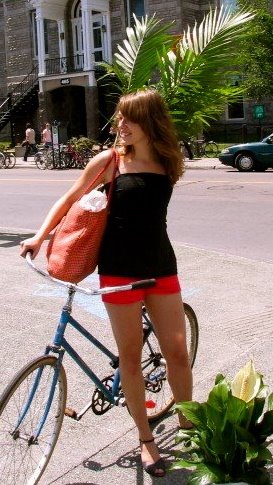“You’re too loud!” A man’s nylon-enshrouded arm waved for my attention, for everyone’s attention. He looked miserable.
He sat among rows of over-prepared tourists, all wearing shoes so sensible they had no place in London. Some were shod with hiking boots. Others with bulbous white trainers, the sort resembling miniature cruise liners on each foot, which is, I suspect, their natural environment. But we were on an open-top tour bus in the centre of London, not the Alps or a 14-day cruise to the Bahamas, though a few wore the T-shirts.
Somehow in a sea of immigration and unparalleled diversity, amid faces and accents of all hues and tones, these tourists still managed to concoct a look that said: We don’t belong here.
Looking back at the still-waving man, I paused, microphone in hand, to assess the situation. He locked bespectacled eyes with mine and crumpled his face like he had a migraine that was entirely my doing. This one’s a problem, I thought – my first delinquent passenger as a new London tour guide.
Perhaps I could have ignored him, had I tried harder. But when I continued to speak, he looked at me like my voice was a busted sewer pipe; like my tour was a test-run for a new method of psychological torture; or, like I was his estranged wife who’d just informed him I’d not only be taking the dog, but the house on the lake as well.
As a tour guide in London during high season, it helps to have a thick skin. Since I don’t have one, I cope in other ways. I see my job as a sit-com, and I’m the main character. The concept offers the false sense of security I need, that everything will work out by the end and I will glean some useful lesson from each episode no matter how cringe-worthy. Each antagonist is carefully chosen for comic value. In this episode, I’d apparently acquired a failing marriage.
Following their father’s lead, the children, swathed in beige safari gear, covered their ears with their hands. Their bony arms akimbo made for pointy elbows in the faces of nearby passengers. The boy moaned and rocked a little. If my voice inflicted as much pain on him as it seemed, I hope the poor child never gets a paper cut. He’d have to be euthanized.
“Maybe you could take it easy and stop talking for a while,” the condescending husband character suggested, gesturing at our suffering offspring, as though it was a perfectly reasonable thing to ask. “You’re talking a lot.”
But I’m a tour guide. Sixty-five passengers, including this man, paid me to talk for two hours straight, from Westminster Abbey to Tower Bridge, and now his issues wanted me to stop. “There’s a public bus that follows the same route and costs ten times less,” I thought, but didn’t say. “And isn’t the commentary the entire point of a sightseeing tour?” I didn’t say either.
Instead, I covered my microphone with my hand and managed a much more discreet, “I’m sorry sir, but these people are expecting me to tell them about London.” I gestured at the other passengers who were polite enough to busy themselves with a statue of a horse. Incensed, he stood, rolled his eyes and took a different seat. My seat. The one reserved for the tour guide. He was now close enough to make me fear the episode might receive an R-rating, if not for intimate touching, then for the rage I might unleash if he continued to play his role so convincingly.
While leading a tour I usually stand, so I didn’t actually need my seat, but I did wonder why he wanted to be closer to the apparent source of his misery. The answer became immediately clear – now I could hear him, too.
In close proximity, he met my every historical fact with a cluck, every anecdote with a huff. The children writhed in pantomime pain just a few seats ahead. Exacting their powers of peripheral observation, they regularly checked for their father’s approval and got the exact opposite from me. Objectively, I must say the scene was impressive. The children’s belts were cinched so tightly and the chinstraps of their sun hats so taut, that their relative range of motion showed real dedication to the cause. If practice makes perfect, I see a future in Japanese bondage for these two.
Hyde Park, Queen Victoria, Marble Arch, I rambled on in the face of adversity. But my mutinous sit-com family was contending for a Golden Globe. My passengers, the live studio audience, were now fixated on this subplot rather than London. A few kindly shot me glances of solidarity. Everyone else shot me looks saying, “I’m so very glad I’m not you.” My studio husband just wanted me shot. I couldn’t wait to be rid of this man and his two snivelling protégés.
With no amicable end to the arrangement in sight, as the bus pulled over to collect more passengers, I had no choice but to start the proceedings. “This is your stop,” I said directly to the man, and I meant it more than I’d ever meant it before. In retaliation he unleashed an expression of unbridled disgust to match my squinty face of disapproval. Following a brief, but intense stare-off, the father finally resolved to add me to his list of failed relationships. He cast a look so final and so clear, I knew exactly what he was saying. “Fine,” said the look. “You can have the dog and the goddamned house. But I’m taking the kids.”
Directing audience attention away as he arranged his things and prepared to leave me – children, backpacks, snack packs, water bottles, camera, map and suntan lotion – I pointed out the Bob Forstner car showroom, because no one can resist a Lamborghini. It was the perfect location for a scene change.
When the bus pulled away from the stop, I looked down at the sidewalk and watched the disgruntled, neurotic triumvirate shrink into the distance, becoming nary more than a tiny beige smudge in a crowd of otherwise pleasant tourists. In this moment I realized I might never see the family again. And with that came relief.








